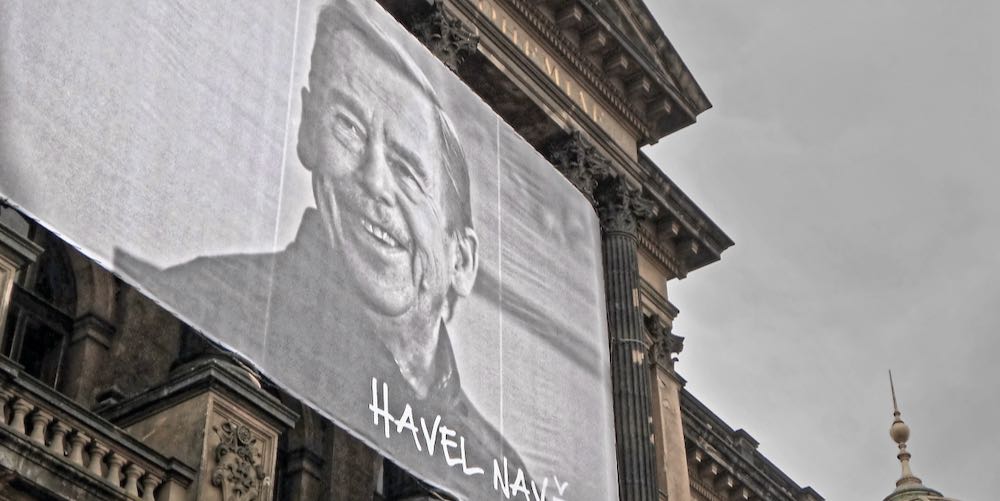Communist Comedy
Before he peacefully helped throw off the yoke of Soviet control over Czechoslovakia, Václav Havel’s plays needled the Socialist authorities’ dreary conformity to Marxist-Leninist ideology. The Garden Party, a 1963 play by Havel uses the absurd experience of a young Czech, Hugo Pludek, to ridicule the empty facade of the drones employed by the Soviet bureaucracy in Hugo’s encounters with members of the government’s Liquidation Office.
Hugo’s journey through the Liquidation Office’s garden party serves as a lesson on bureaucracies’ mind-numbing stifling of an individual’s true character. The empty-headed opinions, one-liners, and observations made by the party-goers expose the audience to the depths of self-delusion that members of the bureaucracy will display to square the circle of their world. In Hugo’s case, the bureaucrats reflected the very conformity expressed by Czechoslovak citizens under Soviet rule. The Garden Party was not an in-your-face, slapstick indictment of the regime. It was a dry, ironic, and subtle impersonation of the soulless Czechs who played their parts like puppets in the Communist government’s theater.
The Garden Party evokes a familiar phenomenon. When a societal narrative becomes deeply ingrained in a culture, it is up to the arts to drag it back into the limelight for examination. No artist does a better job of exposing the absurdity of societal narratives than comedians. In Havel’s time, thumbing one’s nose at the Communist Party might mean deriding the layers of departments, committees, commissions, and other institutions placed between leadership and those tasked with carrying out leadership’s will. Bureaucrats in the play act as preprogrammed cogs, whose sole purpose is to carry out another’s orders. The bureaucrats recoiled in outrage at Hugo’s dismissal of Committee Statements when he sought to use his reason to understand how the bureaucracy functions. The bureaucrats’ reaction to Hugo’s suggestion showcases the extent to which Czechoslovak citizens became absorbed by the Communist Party’s social regulations. That sounds familiar.
There is no plot or major conflict in The Garden Party. Rather, Hugo moves from encounter to encounter within the garden party, learning and observing the mannerisms of the different bureaucrats. He begins his encounters using his logic, reason, and individual experiences to try and connect with the bureaucrats. However, his ambition pushes him to adopt the speech and style of each circle of bureaucrats he encounters, climbing the ladder as he becomes a more effective copycat. Eventually, through his skill in mimicry, Hugo browbeats the director of the Liquidation Office and is made the head of his own bureaucracy. The protagonist Hugo’s transformation from a one-time sloth resigned to playing chess against himself into a powerful bureaucratic leader at the cost of his own identity parallels today’s comedians. When Dave Chappelle or Joe Rogan points out the absurdity of grown men competing against women in mixed martial arts, the public square recoils with the same fervor as Liquidation Office bureaucrats. For a few days or weeks, Dave or Joe become pariahs in the national media, until the next controversy grabs the media’s attention. The reactions to Dave Chappelle or Joe Rogan’s pointed observations range from bewilderment to anger.
Ironically, this was the same fate that awaited The Garden Party’s Hugo: people do not recognize the person they thought they knew. After sacrificing his own identity to easily move among the bureaucrats and rise to the top of the Liquidation Office hierarchy, Hugo returns home to parents that do not recognize him. However, The Garden Party takes this cognitive dissonance to the next level as Hugo does not recognize his own parents. His absorption into the Liquidation Office’s bureaucracy is complete, with his existence being defined by the system he inhabits.
The comedian’s skill at pointing out the way in which social narratives capture individuals parallels the erosion of Hugo’s own individuality in pursuit of his career. The phenomenon of comedians being “canceled” for their own jokes today is a subtler form of artistic repression than what Havel faced. Nevertheless, the retaliations against Havel—the banning of his plays in his home country and eventual total ban from theater in all of Czechoslovakia—lead us to question how close American comedians are to operating in similar climates. Uproar ensued when Chappelle’s alma mater dared to dedicate their theater in his name. Much like Liquidation Office bureaucrats lampooning Hugo for employing common sense in office matters, students regurgitated that Chappelle’s jokes were akin to endangering lives.
At a time when the state was so powerful that openly mocking it would have resulted in a visit from the secret police, Havel used the theater to subtly shine a light on the Communist regime.
Chappelle’s retort to art students engaged in artistic oppression echoed Havel’s observation that “when a truth is not given complete freedom, freedom is not complete.” When comedians do not have complete freedom to express themselves and their skills, comedy itself suffers. The Garden Party showcases how the government’s restriction of speech and regulation of acceptable behavior leaves Hugo’s life as soulless and empty as the same bourgeois that party apparatchiks rail against. Put simply, The Garden Party is a glimpse into a reality where comedy is nonexistent. Comedians like Chapelle, who remarked that “the more you say I can’t say something, the more urgent it is for me to say it,” would, in this dystopia, be relegated to skits and jokes that lack true substance. By the end of The Garden Party, Hugo’s character has become this kind of empty vessel. He’s able to engage with any Communist Party official, and he exhibits the epitome of success. But, just like woke comedians who tip-toe around narratives that provide the richest sources of laughs, Hugo never really says anything at all for the rest of the play.
Ultimately, The Garden Party illustrates the conflict within comedy to determine what is considered “acceptable” language. Hugo’s constant adaptation to whatever situation he finds himself in throughout the play is exaggerated in his use of particular lingo and the speed at which he speaks. The equivalent would be comedians and other artists angling their talent and works, not to whatever they truly want to express, but to what they think the audience will approve of. Hugo makes his way through the Liquidation Office’s garden party and encounters antagonists in the form of different secretaries and directors, allowing the viewer to see the hilarity of each official’s efforts to conform to the acceptable party line.
For example, the Office Secretary’s lines are extremely literary, as though she is reading a prepared statement, to ridicule how lower-level Czech officials regurgitate Party talking points in a rigid, inflexible tone. When greeting Hugo at the door, the Secretary drones that “you can buy here a general admission card, which will provide you the right of free movement throughout the entire topographical extent of the garden as well as with the right of visitation to all attractions organized within the framework of the garden party of the Liquidation Office.” The Secretary’s long-windedness is contrasted later in the play with the office’s Director, who only speaks using four different phrases, like a programmed computer. The sheer variety of different tones, volumes, verbiage, and accents coming from the bureaucracy is meant to show just how little substance is behind their words.
Comedians like Dave Chappelle, Ricky Gervais, Ryan Long, and Andrew Schulz shatter the performative opinions, actions, and attitudes of accepted societal narratives, and this is what makes them so magnetic. Havel’s mockery of the facade of freedom in Czechoslovakia resulted in his work being banned and him serving prison time. At a time when the state was so powerful that openly mocking it would have resulted in a visit from the secret police, Havel used the theater to subtly shine a light on the Communist regime. American comedians may not face those sorts of consequences. But they may see their stand-up routines de-platformed, or even face physical assault by those that purport to be the righteous majority. Havel’s plays serve as a measuring stick of just how encompassing some illiberal behavior and narratives have become in America.
Viewers of The Garden Party are meant to see how suffocating mob-enforced conformity is on an individual. In Soviet Czechoslovakia, the State Security agents shackled artists into producing works that glorified socialism or served the regime, ensuring that Czechoslovaks remained powerless. Comedy, unsurprisingly, was sorely lacking in the Eastern Bloc. Today in the United States, comedy faces challenges from illiberal mobs, thin-skinned audience members, and technology companies that can make or break a comic’s ability to get their material to audiences.
The bureaucrats in The Garden Party could easily be replaced by the mob that practices the heckler’s veto today, as the same empty platitudes expressed by students on college campuses or administrators in positions of power are the same as Soviet bureaucrats. Sloganeering is a stand-in for solutions, the collective muzzles the individual into the system. The Garden Party might serve as a reminder for comics to continue to step outside the boundaries of acceptable language, tone, and styles. That way the cheap conformity that The Garden Party derides is a little weaker throughout America’s comedy scene.



